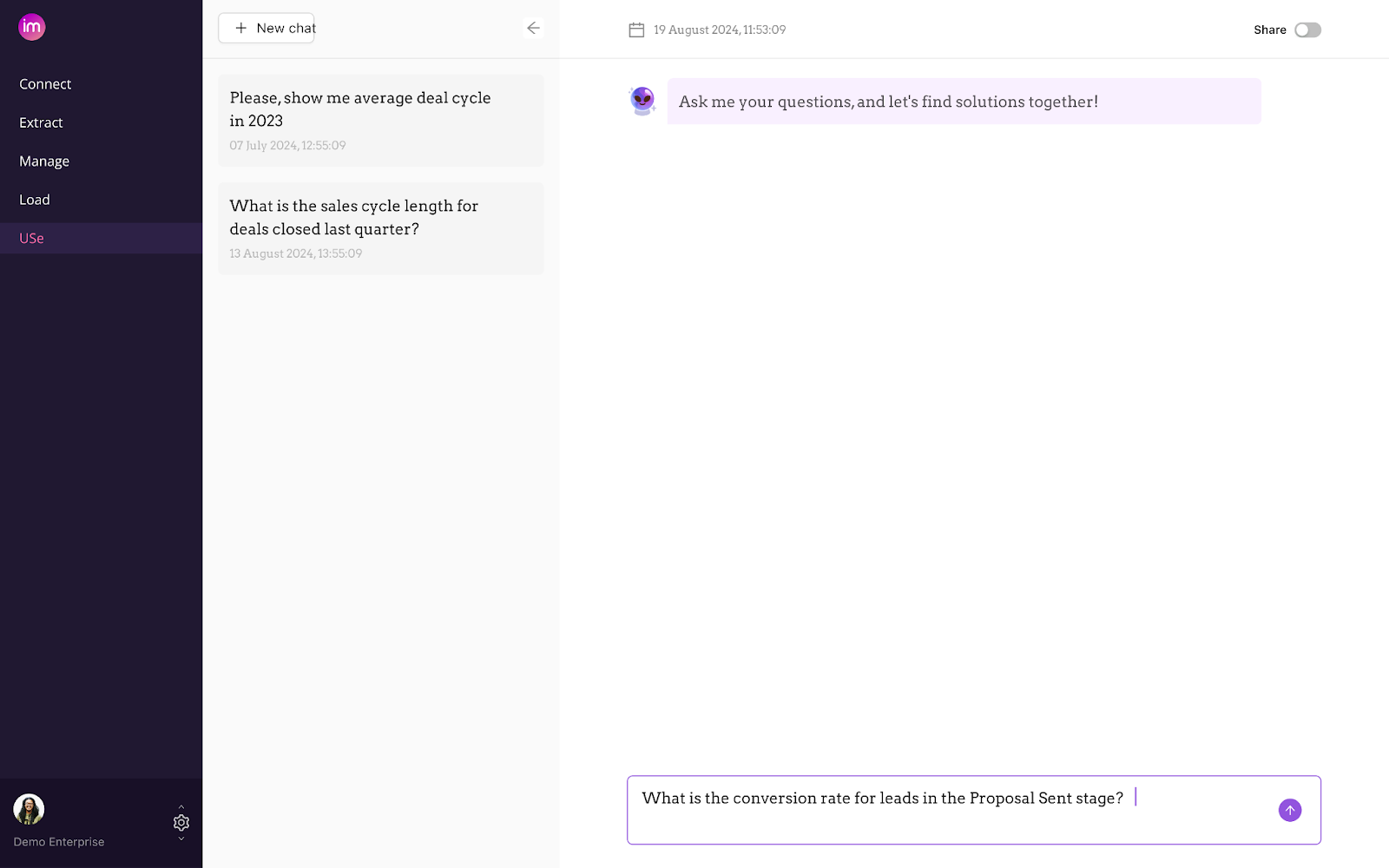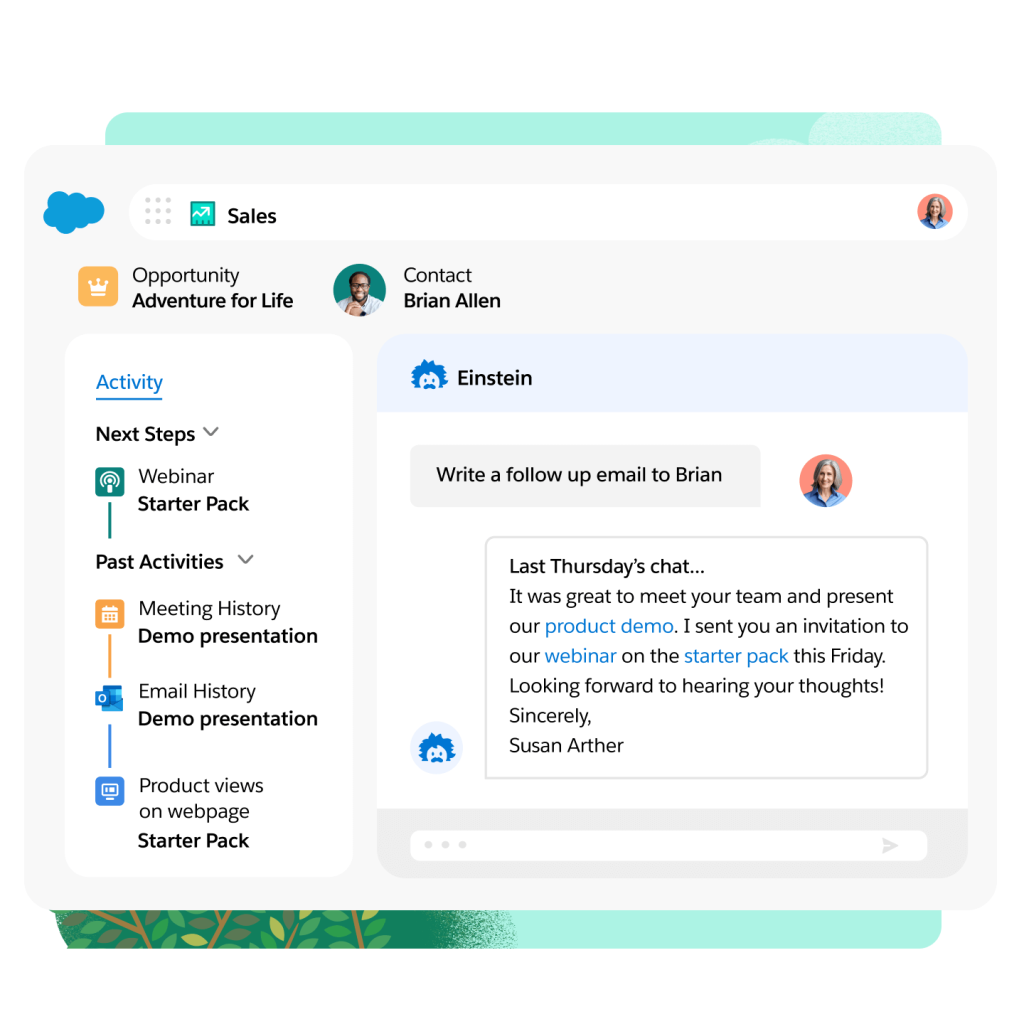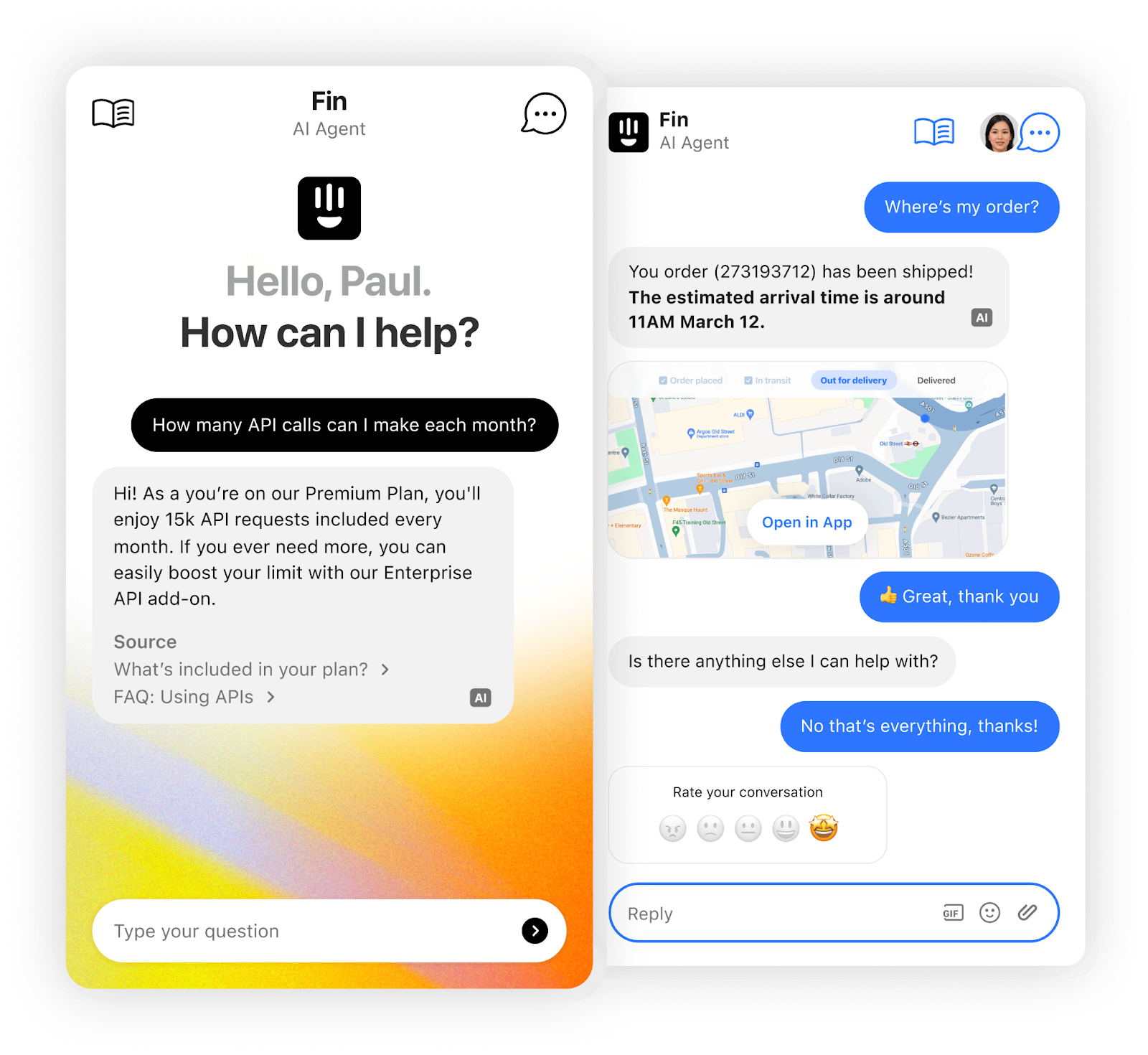By 2026, Gartner expects 35% of Chief Revenue Officers will have GenAI Operations and AI agents on their team. The use of AI in sales will transform how brands identify opportunities, manage customer bases, analyze performance, and boost engagement.
Let's prepare for the AI future and explore the potential of AI in sales and identify the key areas of application that are already in use today.
Understanding AI in Sales
Sales is particularly well-suited for AI applications due to its dynamic and unstructured nature. The complexity of sales processes, with their numerous customer interactions, produces vast amounts of data that can be difficult to manage manually. AI's ability to analyze and interpret this data in real-time offers a significant advantage.
Just like in other areas of application, AI in sales is about leveraging advanced algorithms and machine learning to automate and optimize processes. This includes tools that assist in lead generation, customer relationship management, sales forecasting, and predictive analytics.
AI is also starting to be widely used in decision-making: for predicting customer behavior, identifying patterns, and suggesting the best actions to take at each stage of the sales funnel.
Let’s take a closer look at the 5 most common artificial intelligence use-cases in sales.
Key Components of AI in Sales
1. Data Analysis and Insights
If you think of how to use AI in sales, start with data analysis.
AI can sift through vast datasets, identifying patterns and trends that may not be immediately apparent to human analysts.
Here’s a detailed look at how AI enhances data analysis in sales:
- Machine learning algorithms can analyze historical sales data to uncover insights like which products or services are most popular among specific demographics or identify which sales strategies or channels yield the highest conversion rates.
- AI-driven predictive analytics uses historical data to forecast future sales trends and customer behavior; for example, AI can forecast demand or identify at-risk customers.
- Natural Language Processing (NLP) enables AI to analyze unstructured data, such as customer feedback, reviews, and social media interactions. Using NLP, sales teams can gauge customer sentiment or tailor sales pitches based on the language and sentiments expressed by customers.
- AI can also significantly enhance the quality of sales by automating the processes of data collection and validation.
Lastly, AI provides real-time analytics and reporting capabilities, allowing sales teams to access up-to-date information on performance metrics and customer interactions.
AI-powered tools can also create intuitive dashboards that visualize key performance indicators (KPIs), making it easier for sales leaders to track progress and identify areas for improvement.
Here’s an example.

Improvado AI Agent is a search-driven analytics solution. You ask a question in plain English, the agent translates it to SQL and queries your dataset to present you with findings. You can continue chatting with the agent to derive more granular insights, ask it to build a chart, or provide recommendations.
AI Agent is the tool that provides easy access to actionable insights and helps sales to make more data-driven decisions.
2. Personalization
By leveraging A-driven personalizationsI, sales teams can tailor every interaction to the individual needs and preferences of the prospect, enhancing the overall sales experience and increasing the likelihood of conversion.
Here’s a couple of examples of how to use AI in sales personalization:
- Customer segmentation: AI analyzes customer data to segment audiences into highly specific groups based on behavior, demographics, and purchasing history. This allows sales professionals to create targeted messaging that resonates with each segment.
- Content personalization: AI identifies the type of content that each prospect is most likely to engage with, whether it’s case studies, whitepapers, or specific product information. It can then dynamically serve this content at the right time in the sales cycle, ensuring that the prospect receives the most relevant information.
- Predictive recommendations: AI algorithms can predict what products or services a customer might be interested in based on their past behavior and similar profiles. This enables sales teams to make personalized recommendations that feel tailored and relevant, increasing upsell and cross-sell opportunities.
- Automated communication: AI powers personalized email campaigns and follow-ups by analyzing the optimal time to reach out and the most effective messaging for each individual. This leads to higher engagement rates and a more personalized touch at scale.
- Personalized sales pitches: By analyzing a prospect’s interaction history and online behavior, AI can help sales executives craft personalized pitches that address specific pain points and align with the prospect’s needs. This makes the sales conversation more relevant and compelling.
- Real-time personalization: During live interactions, AI can provide sales reps with real-time insights and suggestions, such as which topics to discuss or which offers to present, based on the prospect’s engagement patterns and profile data.
You might also like: Which AI Assistant Is Best for Marketing?
3. Lead Scoring and Qualification
AI helps sales organizations identify high-potential leads with greater accuracy and efficiency.
Essentially, the process follows the same steps: AI-powered lead-scoring algorithms analyze data to identify patterns and attributes of leads that have converted in the past and assign scores to new ones.
However, AI-powered algorithms can identify subtle patterns humans may miss, leading to more accurate scoring and qualification.
By understanding each lead's unique needs and preferences, AI enables sales teams to craft more personalized and effective outreach strategies.
AI systems, unlike traditional methods, have the unique ability to learn from past interactions and outcomes. This continuous learning process allows them to refine their scoring and qualification models, thereby enhancing their performance over time.

Salesforce Einstein Lead Scoring is one example of an AI-powered solution already available on the market. The tool analyzes your sales data to score leads in the pipeline. The platform is said to refresh every ten days.
4. Sales Forecasting
AI's ability to leverage vast amounts of data can also be applied to reduce the margin of error in sales forecasts.
Here’s how to use AI in sales forecasting:
- Predictive analytics: By analyzing past performance and current market conditions, AI can predict future sales with greater precision than traditional methods.
- Pattern recognition: AI excels at recognizing patterns in large datasets. It can identify trends, seasonality, and correlations between different factors that influence sales outcomes, enabling more accurate predictions.
- Scenario analysis: AI can model different scenarios based on potential changes in variables like pricing, marketing campaigns, or economic shifts. This allows sales teams to understand the potential impact of different strategies and make more informed decisions.
- Anomaly detection: AI can detect anomalies in sales data, such as unexpected drops or spikes in sales, and identify the underlying causes. This helps sales reps quickly address issues or capitalize on opportunities, improving the overall accuracy of forecasts.
- Sales pipeline analysis: AI evaluates the health of the sales pipeline by analyzing the progression of deals, lead scores, and other metrics. It can predict which deals are most likely to close and when, providing a more reliable forecast of future revenue.
By identifying potential risks and anomalies early, AI helps sales teams mitigate potential losses and adjust their strategies proactively, ensuring more stable and predictable revenue streams.
5. Chatbots and Virtual Assistants
AI-powered chatbots and virtual assistants have already become essential tools in sales strategies. These tools help automate routine tasks, provide instant customer support, and enable personalized engagement at scale.
How AI-powered chatbots and virtual assistants are used in sales:
- Lead qualification: AI chatbots can engage with website visitors in real-time, asking qualifying questions to determine their needs and readiness to buy. Based on their responses, the chatbot can either pass the lead to a sales rep or nurture them further with personalized content.
- 24/7 customer engagement: AI chatbots provide round-the-clock support, engaging with prospects and customers even outside of business hours. They can answer frequently asked questions, guide users through product features, and assist with basic inquiries, ensuring that no opportunity is missed.
- Personalized interactions: Advanced AI chatbots can deliver personalized experiences by analyzing a visitor’s behavior, history, and preferences. For example, if a returning visitor shows interest in a specific product, the chatbot can tailor its conversation around that product, offer related suggestions, or provide a discount code, enhancing the likelihood of conversion.
- Streamlined sales processes: Virtual assistants help sales reps by automating routine tasks such as scheduling meetings, sending follow-up emails, and updating CRM entries. This allows sales professionals to focus on more strategic activities, like closing deals and building relationships.
- Seamless handoff to human reps: When a chatbot reaches the limits of its capabilities or when a lead is ready for more in-depth discussion, it can seamlessly transition the conversation to a human sales rep. This handoff is smooth and contextual, ensuring that the rep is fully informed about the prospect’s needs and previous interactions.
- Multichannel integration: AI chatbots can be integrated across various channels, including websites, social media, messaging apps, and email. This ensures consistent and personalized engagement across all touchpoints, meeting prospects and customers wherever they are.

Intercom is an example of a solution that combines AI chatbots, customer messaging, and sales automation into a single platform.
Intercom offers AI-driven tools that assist sales reps with task automation, such as scheduling follow-ups, reminding reps of important actions, and providing real-time insights during customer interactions.
Intercom’s chatbots are designed to engage with website visitors, qualify leads, and provide instant answers to common questions. The bots use AI to understand user intent and provide relevant responses, guiding prospects through the sales funnel.
Key Benefits of AI in Sales
AI offers numerous advantages, from enhancing customer insights to improving sales forecasting. It allows teams to focus on strategic initiatives rather than getting bogged down in manual data management. AI in sales also means…
Increased Efficiency and Productivity
By leveraging AI, sales teams can handle a larger volume of leads and customers without compromising on quality. AI-powered tools such as chatbots and virtual assistants allow teams to engage with more prospects simultaneously, providing instant responses and support, which increases overall productivity.
Better Customer Experience
AI enhances the customer experience by providing instant, personalized, and relevant interactions. Whether through chatbots, personalized emails, or tailored recommendations, AI ensures that customers receive the information and support they need, when they need it, leading to higher satisfaction and loyalty.
Data-Driven Decision Making
AI analyzes vast amounts of data to uncover trends, patterns, and insights that might not be immediately apparent. This data-driven approach allows sales teams to base their decisions on concrete evidence rather than intuition, leading to more effective strategies and better results.
Scalability
AI enables sales teams to scale their operations without a corresponding increase in headcount. For example, AI-powered chatbots can handle customer inquiries and lead qualification 24/7, allowing sales teams to engage with a larger audience without additional resources.
Reduced Human Error
By automating data processing and analysis, AI reduces the risk of human error, ensuring that sales forecasts, lead scores, and customer insights are more accurate. This leads to more reliable outcomes and greater confidence in decision-making.
Make Sure Your Sales Data Is Ready for AI
Before leveraging AI in your sales processes, it’s crucial to ensure that your data is clean, organized, and comprehensive. AI models rely on data, and poor data quality—such as incomplete records, duplicates, or inconsistent formats—can lead to skewed results and suboptimal decision-making.
To prepare your data for AI, you need a solution that can aggregate, cleanse, and normalize data from various sources. Improvado is a powerful platform that solves this challenge. The solution connects to over 500 data sources, including CRM systems, sales and marketing platforms, ensuring that all relevant data is centralized and standardized before being fed into your AI models. By using Improvado, you can ensure your data is AI-ready, paving the way for accurate, actionable insights that drive better sales outcomes.
.png)



.png)
